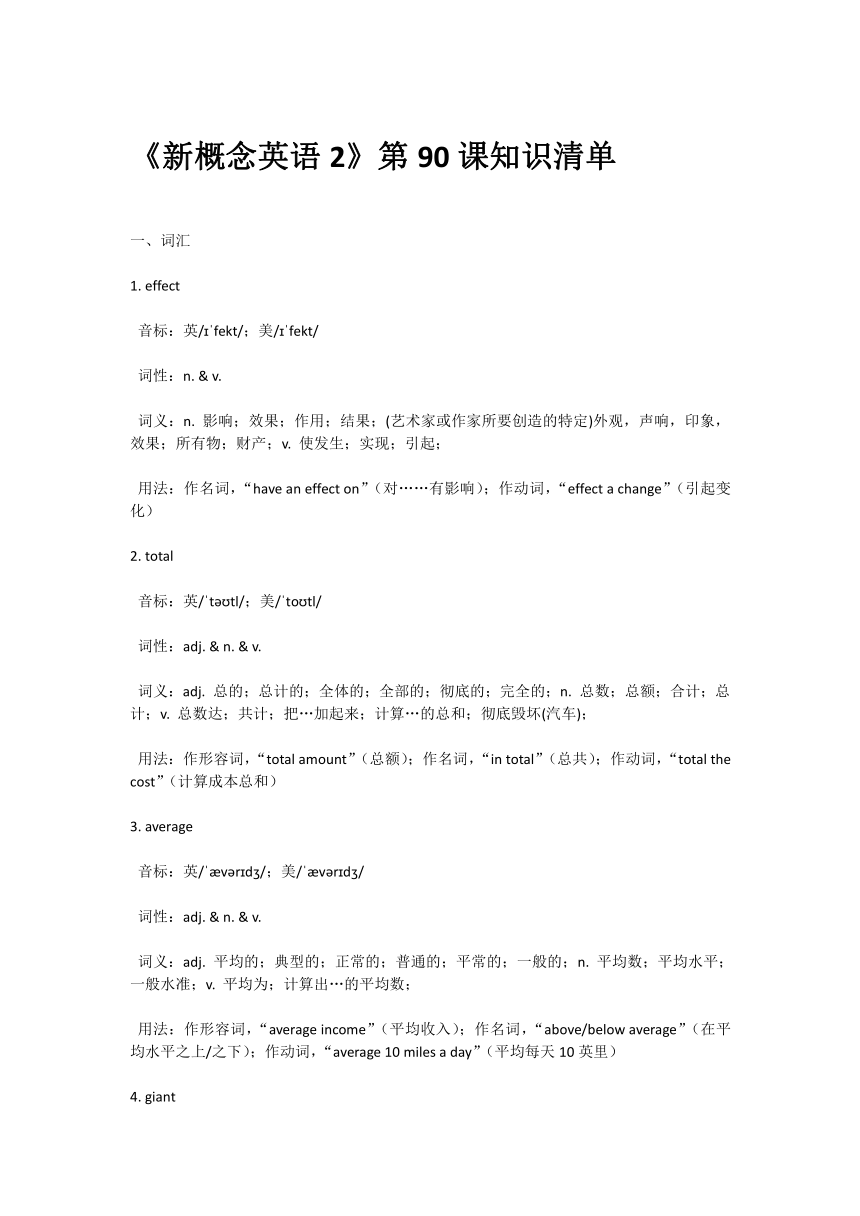
《新概念英语2》第90课知识清单 一、词汇 1. effect 音标:英/ fekt/;美/ fekt/ 词性:n. & v. 词义:n. 影响;效果;作用;结果;(艺术家或作家所要创造的特定)外观,声响,印象,效果;所有物;财产;v. 使发生;实现;引起; 用法:作名词,“have an effect on”(对……有影响);作动词,“effect a change”(引起变化) 2. total 音标:英/ t tl/;美/ to tl/ 词性:adj. & n. & v. 词义:adj. 总的;总计的;全体的;全部的;彻底的;完全的;n. 总数;总额;合计;总计;v. 总数达;共计;把…加起来;计算…的总和;彻底毁坏(汽车); 用法:作形容词,“total amount”(总额);作名词,“in total”(总共);作动词,“total the cost”(计算成本总和) 3. average 音标:英/ v r d /;美/ v r d / 词性:adj. & n. & v. 词义:adj. 平均的;典型的;正常的;普通的;平常的;一般的;n. 平均数;平均水平;一般水准;v. 平均为;计算出…的平均数; 用法:作形容词,“average income”(平均收入);作名词,“above/below average”(在平均水平之上/之下);作动词,“average 10 miles a day”(平均每天10英里) 4. giant 音标:英/ d a nt/;美/ d a nt/ 词性:n. & adj. 词义:n. 巨人;巨兽;巨型植物;大公司;强大的组织;伟人;卓越人物;adj. 巨大的;特大的;伟大的; 用法:作名词,“a giant of industry”(产业巨头);作形容词,“a giant panda”(大熊猫) 5. terrify 音标:英/ ter fa /;美/ ter fa / 词性:v. 词义:使恐惧;使十分害怕;吓坏; 用法:“terrify sb. into doing sth.”(恐吓某人做某事),“be terrified of sth.”(害怕某事) 二、重点句型 1. Fish and chips has always been a favourite dish in Britain, but as the oceans have been overfished, fish has become more and more expensive. 语法点:现在完成时,“has always been”表示从过去到现在一直的状态 ,现在完成时的被动语态,“have been overfished”表示从过去到现在海洋被过度捕捞 ,比较级,“more and more expensive”表示“越来越贵” 。 例句:Pizza has always been popular in Italy, but as the ingredients have become scarce, it has become more and more costly.(披萨在意大利一直很受欢迎,但随着食材变得稀缺,它变得越来越贵。) 2. As a result, fishermen have had to find new fishing grounds. 语法点:现在完成时,“have had to”表示从过去到现在不得不做某事 ,“as a result”表示“结果” ,引导结果状语 。 例句:As a result of the heavy rain, farmers have had to change their planting plans.(由于大雨,农民们不得不改变种植计划。) 3. It is not until recently that fish farmers have begun to grow fish in the cages. 语法点:“It is not until... that...”是强调句型 ,强调“not until recently” ,现在完成时,“have begun”表示从过去到现在开始做某事 。 例句:It is not until this year that students have started to use the new textbooks.(直到今年学生们才开始使用新教材。) 三、语法聚焦 1. 现在完成时 构成:主语+have/has+过去分词 。当主语是第三人称单数时用has,其他人称用have 。 用法:表示过去发生的动作对现在造成的影响或结果 ,常与already、yet、just等副词连用 ;表示从过去开始一直持续到现在的动作或状态 ,常与“for + 时间段”“since + 时间点”等连用 。如“I have already finished my homework.”(我已经完成作业了) ;He has lived here for five years.(他在这里住了五年了) 。 2. 现在完成时的被动 ... ...
~~ 您好,已阅读到文档的结尾了 ~~